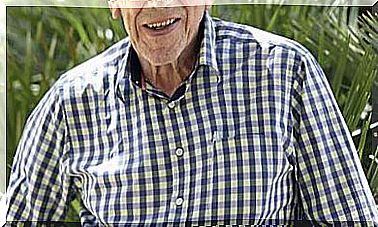Dare To Be Yourself!
Life can become a labyrinth when we walk through it without knowing who we are or what we want. Knowing yourself requires being open to accept and face what arises.

Carl G. Jung once said that we spend the first part of our lives trying to please others and the second part trying to please ourselves. The affirmation of this Swiss psychiatrist and psychologist contains a lot of force since few things cause as much suffering as wanting to be what we are not.
Some people feel angry when they realize how they create their own discomfort with something as simple as not being well in their own skin. Wanting at all costs to be like another person to feel loved is perhaps the most terrible of solutions.
In this age of mobile phones it is said that there are two types of people: iPhone people and Samsung people . Nothing is more painful than, being an iPhone, wanting to be a Samsung or, conversely, to be a Samsung and pretend to be an iPhone . The crux of the matter lies in being able to live our own life beyond fashions or conventions.
Face your life without hiding behind layers
As the poet WB Yeats wrote, “The true hero is one who has the courage to step into the depths of himself. ” This mythical journey allows us to discover, little by little, that we are not what we would have liked to be, or that we do not come close to what others expected us to be.
The transition between realizing that we may not be delighted with who we are and yet accepting oneself opens a life stage that can be peppered with disappointment, be painful, or present as a disconcerting period, in which everything that made sense. Until then it staggers under our feet.
This process of self-discovery that leads to maturity can happen at any age, although as a general rule in adulthood we devote more attention to it.
Let’s put aside reason to be authentic
One of the stages of life that is most important in the construction of identity is when, as children, we begin to have the use of reason. At that age we begin to move away from what we call “the experience” to rationalize it, to think about it. We reflect on what happens to us and forget the enjoyment of living.
Depending on the environment, we try to be accepted by our adult referents and our loved ones. We receive messages about what happens to us and we encode them to adapt to it, in our need to be cared for.
What usually happens is that we draw conclusions that are biased by the love or pain we feel. That leads us to conclude things about who we are without having the data or the knowledge to be fair. In this way we configure our personality, understood as the way in which we present ourselves to the world.
Don’t get lost behind the mask
Mythologies and religions agree that fear appears when moving away from the gods or divinity. Today we could say that moving away from divinity is equivalent in a way to moving away from the best of oneself, which gives rise to fear. When this arises, we show the other what we think they want to see.
The fear of heartbreak and abandonment leads to clinging to an ideal concept of self that we believe can protect us from rejection.
According to Virginia Satir, creator of family therapy, we carry within us multiple faces, different identities that we present depending on the environment. Wanting to present yourself as “Good Mother”, someone “Intelligent” or to think that you are “Tonto de Remate” is nothing more than showing one of those masks that we have learned to wear according to the occasion and that can make us feel bad even if we think we need them to be accepted by others.
But beware, whoever never gets lost in the first part of life also assumes the danger of never finding himself.
We want to be another
“We have found the enemy: it is us,” read a cartoon by the famous American cartoonist Walt Kelly.
It is not uncommon for us to realize, with the passage of time and the assumption of responsibilities, of the situations in which our behavior makes us uncomfortable. Then one is not satisfied with being the way he is and wants to change to act as he thinks others have told him to act.
It is common to want to be different to face the things that we fear or that hurt us in a different way. “I shouldn’t care,” says the employee offended by her boss’s words. “I have to be brave,” says the husband who wants to separate from his wife. But it’s easy for neither of you to get your wish.
Often times, the employee continues to care about the treatment of her superior, and the husband remains resigned with the wife. The feeling is terrible when a person asks himself to be another, to have resources that he never had or that are not his style … and he does not achieve it. It is tragic to fail to be who you are not.
Explore the source of discomfort
When we detect something about ourselves that we do not like, we can ask ourselves what we are looking for with that behavior. Many of the things we do pursue the love or recognition of the other, or perhaps their surrender.
Discovering these kinds of intentions for the behavior helps to “improve” and accept it. Stopping struggling with an attitude or behavior is a great way to change it.
Who has not ever gone to bed thinking: “tomorrow I will change” ? However, why don’t we do it? There are apparently simple changes but our inner essence rejects them.
For a chaotic creative, being orderly could be boring. For a shy young woman, becoming the life of the party could be risky. Many people would not like themselves after having performed the miracle of being someone else.
Shed your capes
The key lies, as Rilke would say, in starting the only possible journey, the one that heads inward looking for our genuine essence.
In each person there are many skins that cover the depths of his heart, wrote the German theologian Master Eckhart. Hides perhaps as thick and hard as those of an ox, that is why she does not know herself.
The person must enter their own terrain, learn to know themselves knowing that the first step towards self-discovery is born with the understanding of the discomfort caused by being away from themselves. We reach maturity when we realize that, in essence, all is well in our own world.
Be reconciled with your interior
It is never too late to do something as daring and dangerous as allowing yourself to be yourself. In some moments of self-absorption or contemplation we glimpse our own scaffolding and our unconscious mind sends us symbols and information so that we stop falling into the struggle we have with our nature.
Being yourself can go through attending to our feelings and reactions and reviewing everything we experience. What things do we do well? What things bother us? How do we want to react? These reactions that we want, have we ever carried out in similar situations?
If we have never acted the way we think, it may be time to start connecting with our inner selves. The secret is to recognize what comes to us easily, the fluid response. In our spontaneous actions our inner wisdom usually lies.
Nature is at odds with the will and that means that change is almost never the result of using it. Change usually arises from the cessation of hostility and collaboration between parts of ourselves that sometimes seem opposing. Perfecting our resources, not exchanging them for others, may be the solution, without rejecting others or oneself.
Enjoy is important
What things did you enjoy in your childhood? And in adolescence? In adulthood, you have probably stopped doing many of those things. A good way to recover yourself is to take a few minutes to think about what you have put aside. Redoing some of the things that pleased you is a way to start being yourself.
There are practices that help to contact our true self. Taking drama classes can be helpful. Many NLP exercises reconcile with the best of oneself.
When the pain is great and makes daily life difficult, a psychotherapist or an expert in health or medicine can widen the vision.
Give yourself from the heart
The Johnny Cash song Take me home refers to this point when in a verse it says: “Crossroads, take me home, to the place I belong.” When we meet ourselves, we begin to enjoy the feeling of returning home and we can face life with less effort and use of psychic energy.
It is not easy to learn not to fight and to live from a genuine place. Meditation seems like a way to get there, and well-targeted psychotherapy can also be a valuable help. Exercise allows you to open up to your own body and teaches you to listen, while modulating your emotions and inviting you to be constant in your practice, enjoying it for yourself.
To stop being someone else involves loosening the fear of rejection and, in small steps, addressing the fact that perhaps not everyone is happy with oneself. Learning to frustrate the environment in a moderate way and experiencing deep acceptance can take some time.
You need courage and determination to face change
For this reason, the transition to a more mature position must be carried out with determination, tenderness and humor. These three energies facilitate the assumption of one’s own being and allow others to better accompany us on this almost mythical journey towards well-being.
Assuming your own emotions and stopping struggling to change them is the crucial step for self-acceptance, because only when we recognize our feelings can we perfect them.
So, for example, the person who gets angry can perfect the warrior within him: is he fighting the right enemy and can he use that energy in a worthy fight? Can the person who doubts learn to sustain doubt and live without certainties? He who loves without being reciprocated, can he give away his love without expecting anything in return?
These are some examples of how to “improve” without having to force anything against our spirit. This is a great challenge. Being yourself to enjoy life is a question that requires courage, because the hero is the one who discovers his world and gives himself to it with all his heart.
Bibliography
- J. Bradshaw. Come home , The Beginning Books
- S.Keen and A. Valley-Fox. His mythical journey , Ed. Kairós








